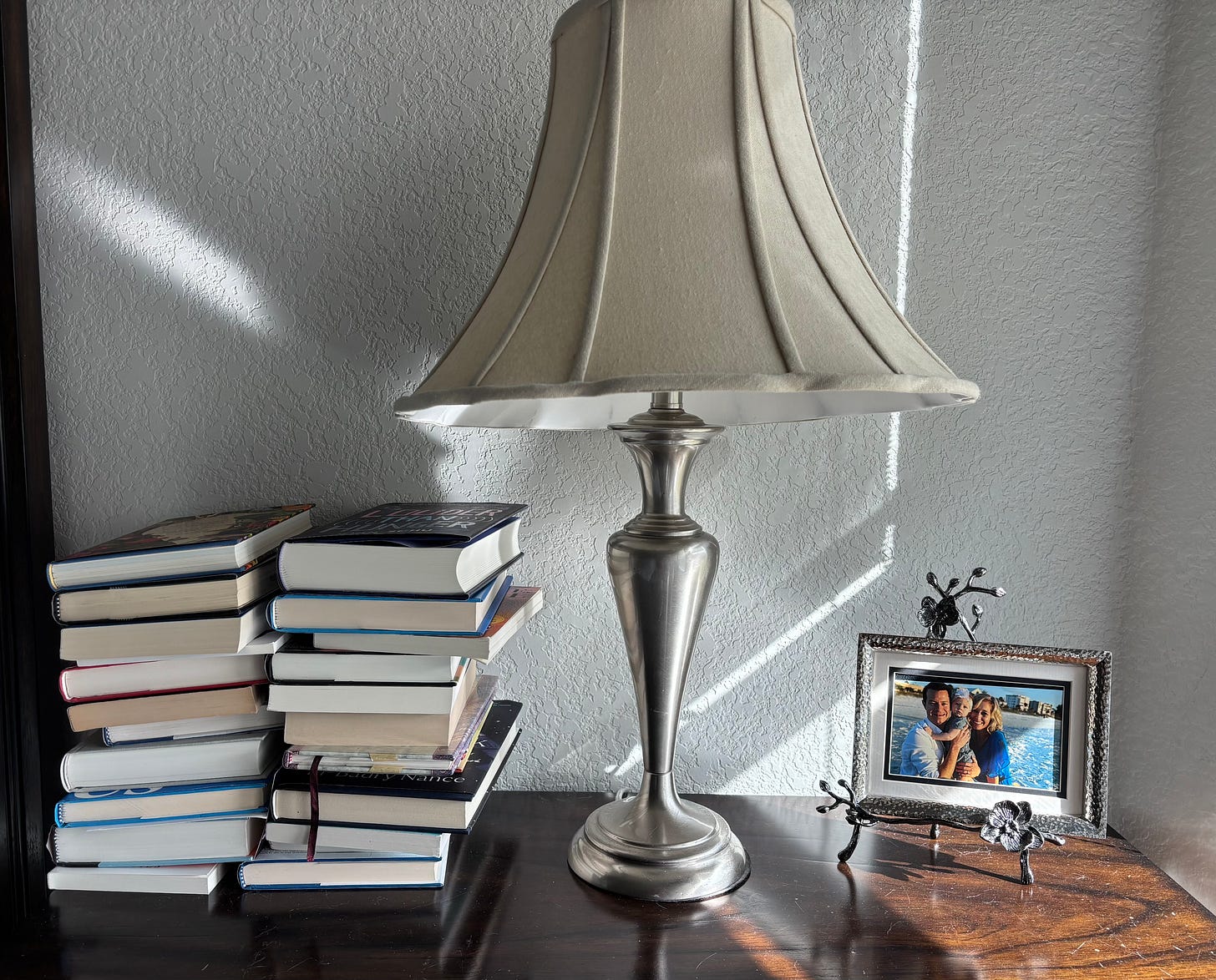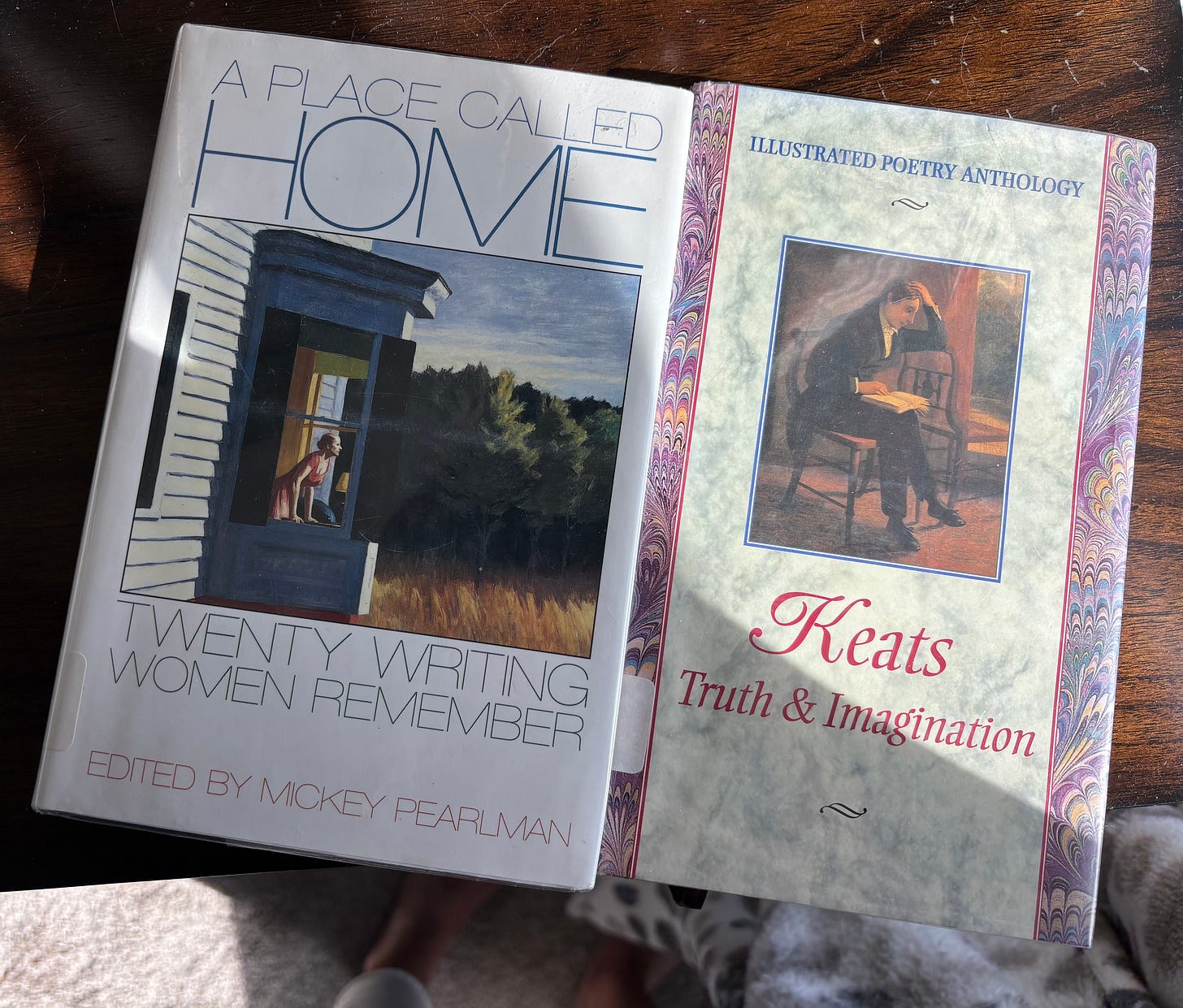The other night as I was getting into bed, I pulled out a book from the bottom of my nightstand stack and watched the whole stack collapse. Some of the books fell onto my pillow. Others slid into the crack between the nightstand and my bed.
It was as though the heap of books was sending me a message: “Pssst. I’m still here. Please read me!”
This past year, my nightstand stack has been largely aspirational. I’ve been so busy teaching, writing my book, and freelancing that I haven’t had as much time as I’d like to read at night. (And yet, somehow this hasn’t stopped me from buying a new hardcopy book nearly every week!)
I’ve mostly been listening to audiobooks on my commute and, though it’s not the same experience as holding a book in my hands, it’s a format I’ve come to appreciate. Audiobooks have helped me remain an avid reader, and they’ve made me a better listener. Years ago, I would have been too easily distracted to listen to an entire book, but my ears have become attuned to the sound of narration. And now I feel as though I can better appreciate writers’ voices both on and off the page. (My favorite audiobooks are the ones read by the authors themselves.)
Now that a new year is upon us, I hope to start tackling the nightstand stack. It contains so many great books, which I’m going to list out here. Part of the fun of reading is letting others know what you’re reading (or in this case what I hope to read)!
Louder Than Hunger a novel-in-verse by John Schu. This YA book is about a 13-year-old boy named Jake, who is struggling with anorexia. One of my colleagues reviewed the book for The New York Times and highly recommended it. As someone who struggled with anorexia in my teenage years, I’m eager to read the book, and I appreciate that it’s helping to show the diversity of people who struggle with eating disorders.
Liliana’s Invincible Summer by Cristina Rivera Garza. This book won the Pulitzer Prize this year, and it’s been on my list ever since.
Why We Remember: Unlocking Memory's Power to Hold on to What Matters by neuroscientist Charan Ranganath. I’ve been wanting to read this book ever since reading this New York Times feature about the author. I’m fascinated by memory — its malleability and unreliability, and its power as a storytelling device.
The Comfort of Crows: A Backyard Year, by Margaret Renkl. I’ve flipped through this book a few times to admire the illustrations that accompany each chapter. The book highlights the passing of seasons, and it seems like a delightful read.
Body Truth: How Science, History, and Culture Drive Our Obsession with Weight — And What We Can Do About It, by Harriet Brown. I’ve been a longtime fan of Brown’s work but haven’t yet read this book. It’s closely tied to a lot of the topics I write about, so I’m eager to dive in.
The Art Thief, by Michael Finkel. The book, which about the most prolific art thief of all time, has gotten several good reviews. My 7-year-old and 8-year-old recently saw the book on my nightstand, and now they’re intrigued by it too!
Good Bones, by Maggie Smith. I love Smith’s work and have read her memoir and other poetry collections, but I have not yet read this highly acclaimed one.
A Place Called Home: Twenty Writing Women Remember, edited by Mickey Pearlman. I stumbled upon this gem at a used book sale recently and was intrigued. The book features essays from Dani Shapiro, Lois Lowry, and other female writers who talk about what home means to them.
Truth and Imagination, by John Keats. While at the used book sale, I also came across this illustrated anthology of poems. I haven’t read Keats since college, and I wanted to change that. I like reading poems at night; they’re often a lighter lift than a long chapter.
Thin Skin, a book of essays by Jenn Shapland, who “probes the lines between self and work, human and animal, need and desire.”
The Art of Revision: The Last Word, by Peter Ho Davies. Some of my local writer friends have recommended this book, which pulls in examples from Flannery O'Connor, Carmen Machado, and Raymond Carver. The book appeals to the editor in me, who loves geeking out on the revision process.
Nothing Personal by James Baldwin. OK, I did read this one, but I starred a lot of passages that I want to return to, so I’m keeping it on the nightstand for now. I keep coming back to this particular quote: “One discovers the light in darkness, that is what darkness is for; but everything in our lives depends on how we bear the light. It is necessary, while in darkness, to know that there is a light somewhere, to know that in oneself, waiting to be found, there is a light.” Isn’t it great?
I’d love to hear from you! Have you read any of these books? What books are in your to-read stack?
My book Slip: Life in the Middle of Eating Disorder Recovery won’t be out until August 5, but you can now pre-order it! Pre-orders help expand a book's reach, and my hope is that this book reaches and helps as many people as possible. You can find Slipwherever you buy books:







I’m currently reading The Sentence by Louise Erdrich, in which a bookish character says she keeps two stacks of books by her bed: a “dumb” stack and a “smart” stack. Depending on her level of mental acuity when she gets in bed at night, she chooses a book from one stack or another. I think it’s brilliant. I plan to adopt this approach in 2025!
I loved The Comfort of Crows! It’s a great one to start this month, as it begins with the first week of winter. I kept up with it through the year/seasons and it was such a lovely, low-pressure way to read it.